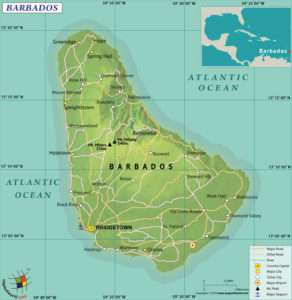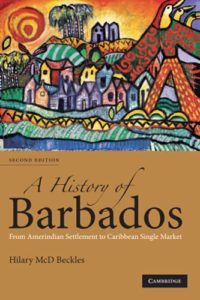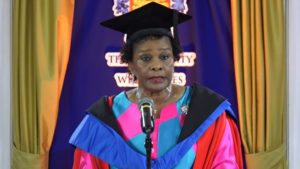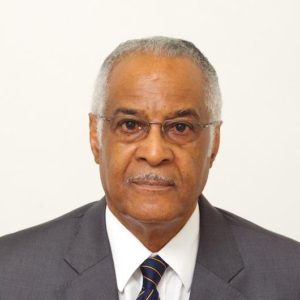|
Getting your Trinity Audio player ready...
|
Reading Time 11 mins
November 25, 2021
Introduction
“Surely the symbolism implicit in having a native Barbadian as Head of State will convey a subliminal message to the youth that they can also aspire to reach the highest office in the land.”
The event that is to take place in Barbados on 30 November 2021 will be an event of historic necessity. Barbados will become a republic within the Commonwealth. Her Excellency, Dame Sandra Mason, the present native Governor-General, will replace Queen Elizabeth, the monarch of the United Kingdom, as the Head of State of Barbados and the island’s first President. This sea change in our form of government has taken 55 years to eventuate. Ever since Barbados became independent on 30 November 1966, the principal qualification for being Head of State of Barbados was that that person was born into the Royal Family of Great Britain. The Head of State has been automatically the person who is Monarch of the United Kingdom.
is to take place in Barbados on 30 November 2021 will be an event of historic necessity. Barbados will become a republic within the Commonwealth. Her Excellency, Dame Sandra Mason, the present native Governor-General, will replace Queen Elizabeth, the monarch of the United Kingdom, as the Head of State of Barbados and the island’s first President. This sea change in our form of government has taken 55 years to eventuate. Ever since Barbados became independent on 30 November 1966, the principal qualification for being Head of State of Barbados was that that person was born into the Royal Family of Great Britain. The Head of State has been automatically the person who is Monarch of the United Kingdom.
The Historical Journey
Since 17 November 1966 when the U.K. Parliament passed the Barbados Independence Act, 1966, in which responsibility for the governance of Barbados was vested solely in the government of Barbados, there have been sporadic discussions concerning the desirability of Barbados becoming a republic. Two governments of the Barbados Labour Party took soundings from the people. First, in 1977, the government led by J.M.G. “Tom” Adams, appointed a Commission of Enquiry under Sir Mencea Cox to sample public opinion. The Cox Commission reported in 1979 and recommended retention of the monarchical system of government for Barbados. Then, in 1996, the Owen Arthur administration appointed a Commission of Enquiry chaired by Sir Henry Forde, with terms of reference, inter alia, “to determine the necessity for retaining the monarchical system of government……to make recommendations concerning the appropriateness or otherwise of maintaining Barbados’ links with the British Crown.”
The Forde Commission reported in 1998 after extensive consultations locally and overseas where Barbadians were concentrated. It recommended that “our system of government should be a parliamentary republic with the Head of State being a President”. (p.42, para.8.10).
After 1998 some steps were taken to advance the case for republican status. The Cabinet held a weekend Retreat about 1999 to examine the multitude of recommendations of the Forde Commission. Not much was achieved. And when President A.N.R. Robinson of Trinidad and Tobago found himself in conflict with Messrs. Basdeo Panday and Patrick Manning in 2000 over the appointment of a Prime Minister for the Republic of Trinidad and Tobago, the anti-republic lobby in Barbados vigorously opposed Barbados’ becoming a republic. Indeed, the opposition was so strident that Prime Minister Arthur shelved the idea and abandoned further action. However, in 2005, during Arthur’s last term as Prime Minister, a Referendum Bill was passed providing for the holding of a referendum on the question included in the Bill “whether Barbados should become a parliamentary republic with the Head of State being a President who is a citizen of Barbados?” However, this Act (now Chapter 11A of the Laws of Barbados) has never been proclaimed and it is not in force as a statute.
Most recently, on 15 September 2020, in a “Speech from the Throne”, to parliamentarians and Barbadians, the Governor-General prepared Barbadians for the coming of the republic in these terms:
“Barbados will take the next logical step towards full sovereignty and become a Republic by the time we celebrate our 55th anniversary of Independence.”
On the Day of National Significance, 26 July 2021, Prime Minister Mottley made the following announcements:
“On 30th of November, this year our great nation which we love shall become a parliamentary republic……The Cabinet has accepted the recommendations of the Forde Commission with minor modifications…..There will be a non-executive President elected by an Electoral College of Parliament……We will make amendments to the Constitution to allow for the swearing-in of the President on 30th November. From December 1st, we begin the journey of settling a new Constitution.”
The Methodology to become a Republic
“[T]he Oath of Allegiance… is now changed to ‘true allegiance to Barbados, according to law.'”
Embedded in the words of the Prime Minister was an outline of the methodology to make the republic a reality. First, there would be amendments to the Constitution to allow for the swearing-in of a President instead of a Governor-General. Secondly, as of December 2021, the government will engage in public discussions with the people with a view to developing a new and autochthonous Constitution.
Part 1 has happened. On 11 October 2021, the Constitution (Amendment)(No.2) Bill 2021, “to provide for Barbados to become a republic with a President who shall be the Head of State of Barbados” was proclaimed and is in force as an Act of Parliament. And, on 20 October 2021, both Houses of Parliament, in a joint session elected Dame Sandra Mason as the first President of Barbados. Although the Constitution consists of ten Chapters, the main focus of the legislation was the substantial amendment to Chapter IV which deals with the appointment, powers, and functions of “the Governor-General”. The words “Governor-General” are now replaced in Chapter IV and, wherever else they appear in the Constitution, by the words “the President”.
The Act, inter alia, makes provision for –
- transfer of the functions of the Governor-General to the President;
- the procedure for electing and removing the President;
- tenure of the President – 4 years;
- certain consequential changes in nomenclature e.g. replacing “the Crown” with the words “the State”.
Two legal fictions, rooted in constitutional theory, have happily been swept away by the recent legislation. The concept of “the Queen-in-Parliament” involves notions of “the Crown” in its legislative capacity passing legislation through both Houses of Parliament. For the last 55 years, the Constitution contained the following provision in section 35:
“35. There shall be a Parliament of Barbados which shall consist of Her Majesty, a Senate, and a House of Assembly.”
The other fiction was to be found in section 63(1) which provided that:
“63(1) The executive authority of Barbados is vested in Her Majesty.”
The reality has been that the Queen has had no role in respect of legislation passed in the Parliament of Barbados. And, whereas the Cabinet of Barbados is the executive branch of government, she has also played no part in the decisions of the Cabinet. For those of us who support the transition to republican status, the existence of those irrelevancies in our Constitution in the 21st Century may well be considered an affront to our sensibilities.
To put the abolition of the monarchical system beyond doubt, the Oath of Allegiance that required “true allegiance to Her Majesty Queen Elizabeth II, Her Heirs and Successors” is now changed to “true allegiance to Barbados, according to law”. And no longer will anyone serving as Head of State take an Oath to “well and truly serve Her Majesty Queen Elizabeth II, Her Heirs, and Successors”. No longer will the Head of State of Barbados be, in the language of the Cox Commission, “a remote, hereditary, non-Barbadian monarch”.
Reflections on the Journey towards Republicanism

Dame Sandra Mason, the governor-general of Barbados, will replace the Queen as the island’s head of state.
Independence Day 2021 will not only be an occasion of celebration. It will also afford an opportunity for Barbadians to reflect on the journey to republicanism and raise their emotional and rational consciousness. Barbadians everywhere should be energized by the realisation that, after 55 years, the last vestige of a link with the British monarchy has been legally severed once and for all. We will reflect that our independence and sovereignty will be complete with the repatriation of the Constitution. We will reflect that, in 1951, Grantley Adams (as he then was), achieved Universal Adult Suffrage for us and set Barbados on its journey to be a confident democracy. We will reflect that Errol Barrow (as he then was), in 1966, famously led us away from “loitering on the premises of the Colonial Office after closing time” into Independence.
We will reflect that, in 2005, Owen Arthur ensured that we accept both the appellate and original jurisdictions of the Caribbean Court of Justice and delink from the Judicial Committee of the Privy Council. We were not only convinced of the intellectual and moral competence of our own homegrown jurists but we earnestly desired to give our people greater access to justice by repatriating the judicial branch of government to the Commonwealth Caribbean region.
Developing the Republican Constitution
Part 2 of the Barbados Government’s strategy for creating a republic presently represents unfinished business. The existing Constitution is from the same template as those of other Commonwealth Caribbean countries which achieved independence during the 1960s and 1970s. The great Constitutional lawyer, Professor Stanley de Smith explained in his book “The New Commonwealth and its Constitutions” (1964), that the constitutions of that era were based on “the Westminster model”. He described that model thus:
“The Westminster model can be said to mean a constitutional system in which the head of state is not the effective head of government; in which the effective head of government is a Prime Minister presiding over a Cabinet composed of Ministers over whose appointment and removal he has at least a substantial measure of control; in which the effective executive branch of government is parliamentary inasmuch as Ministers must be members of the legislature; and in which Ministers are collectively and individually responsible to a freely elected and representative legislature.”
To the extent that the Constitution is British in its conceptualisation and expression, it is not autochthonous. It does not spring from the people! Moreover, now that we have worked that Constitution for 55 years, it is clearly time for review. However, the bifurcation of the process towards republicanism has not sat comfortably with many Barbadians although I believe that the vast majority of the population support the change. The constant criticism of the process is that there has not been sufficient public discussion of the implications and nuances of “going republic”. Many commentators point to a promise by Owen Arthur to subject the matter to a referendum. I suspect, however, that the government has been aware firstly, that there is no legal requirement for a referendum and, secondly, that a referendum can be an unruly horse. When the issue of republicanism was put to the Australian electorate in a referendum, it was defeated. Similarly, the government will also be conscious that the regional experience of referenda is not a happy one. Students of the political history of the region will recall that, in 1961, the Jamaican electorate was asked the following question in a referendum: “Should Jamaica remain in the Federation of the West Indies?” The majority voted “No”. That vote sounded the death knell for the West Indies Federal experiment. The governments of Grenada and St. Vincent and the Grenadines referred the question of removing the Judicial Committee of the Privy Council as the final appellate court for those countries to referenda. The people voted against joining the Caribbean Court of Justice and in favour of retaining the Privy Council. Political scientists warn that referenda can often allow the main issue to become blurred by extraneous considerations.
When public discussion of the content of a new Constitution takes place next year, not only will the recommendations of the Forde Commission be revived but the people themselves will have the opportunity to advance new thoughts. I anticipate discussion of:
-
- including in the Constitution, the right to vote;
- strengthening the independence of the Judiciary;
- the responsibilities of the individual;
- the power of the Prime Minister;
- accountability of public officials and parliamentarians;
- expansion of human rights.
Prime Minister Mottley has voluntarily given up some of her powers. For example, choosing the Governor-General (or President). Under the new arrangement for the appointment of a President, the members of both Houses of Parliament will elect the President. She has also discarded her role of nominating persons to be appointed as Judges, after consultation with the Leader of the Opposition by the establishment of a Judicial Appointments Committee to advertise for, interview, and recommend the appointment of judges to the Supreme Court.
Turning to the matter of human rights, Commonwealth Caribbean Constitutions have been deficient in providing for the economic, social, and cultural rights of the individual – Art.2 of the International Covenant on Economic, Social and Cultural Rights (1976) provides:
“Each State Party to the present Covenant undertakes to take steps, individually and through international assistance and co-operation, especially economic and technical, to the maximum of its available resources, with a view to achieving progressively the full realisation of the rights recognised in the present Covenant by all appropriate means, including particularly the adoption of legislative measures.”

The South African Constitution includes a number of these types of rights (sometimes called “second generation rights”) such as the right to a healthy environment; the right of access to adequate housing; the rights to food, water, health care; the right to education and the right of access to information held by the government. Public discussion on the content of a new Constitution will surely and, quite properly, address these second-generation rights. As Tracy Robinson, Arif Bulkan and Adrian Saunders observe in their book “Fundamentals of Caribbean Constitutional Law” (2005) these types of rights “require affirmative action by governments to secure the social and economic wellbeing and cultural integrity of members of society”.
There is another matter that, in my opinion, could improve the quality of governance in Barbados and, at the same time, provide greater accountability. Ministers of one House should have the right to attend sittings of the other House and participate in proceedings relating to their particular Ministry.
I have randomly selected only a few matters that I think must be included in the discussions on a new republican Constitution. Obviously, there are and will be many more. We must ever be mindful that a Constitution is intended to be a living instrument, which is not only for today but which looks into the future and which is intended to be relevant for decades.
Will Barbados’ Decision start a Trend?
It is arguable that having regard to the constitutional realities of contemporary Barbados, it is a de facto republic already even if that is not the de jure position. And the same observation may apply to other states of CARICOM. Barbados’ change to a parliamentary republican form of government, retaining the majority of the features of the independence Constitution but updated to be more contemporaneously relevant and substituting a native Barbadian as Head of State in lieu of the British Monarch is a matter of important symbolism. Symbolism finds resonance at a cerebral and emotional level. It can often inspire confidence in a people and improve their self-esteem. Surely the symbolism implicit in having a native Barbadian as Head of State will convey a subliminal message to the youth that they can also aspire to reach the highest office in the land.
For too long the overlay of the colonial condition has imbued Commonwealth Caribbean people with a heavy dose of self-doubt and a lack of self-confidence. Fortunately, however, the Barbados Labour Party governments of Owen Arthur and Mia Mottley have given the lie to the perception that Barbados is weighed down by reactionary and conservative attitudes. The establishment in Barbados of a republican form of government is entirely consistent with the Arthur reminder when discussing the matter of sovereignty on an official visit to Port-of-Spain that “Massa Day Done”; his steadfast opposition to the Shiprider Agreements peddled by the USA in the late nineties, and Barbados’ unrelenting advocacy and support for a Caribbean Court of Justice to replace the Judicial Committee of the Privy Council (JCPC).
However, I am obliged to confess that, having witnessed, at first hand, the unconcealed desire of certain Commonwealth Caribbean governments and people to remain yoked to the JCPC, I do not hold out much hope that other governments will follow Barbados’ example in the foreseeable future. But nothing would give me greater satisfaction than to be proven wrong.


I am not opposed to Barbados becoming a Republic. I’m just not particularly happy in the manner in which it has been done. For years the parties could not agree on who would lead Barbados to the next stage – being a Republic. The failure is really a failure of the Parliamentary system which severely breaks down when there is no opposition to hold the government in check.
In Barbados the current Government has all the seats in the House bar one – so can push through anything – including constitutional changes like the making Barbados a Republic. This is the first stage of Barbados mirroring another Parliamentary Republic – Singapore. Interestingly since 1959 Singapore has been dominated by one party. Lets hope Barbados is not on its way to being like that.
Here in the UK all we are hearing on the news today on the eve of Barbados becoming a republic and breaking ties with its old colonial master is about how Barbados is now looking to be China’s best friend. I’ve lived in Asia for the last 20 years. Its very sad to see the leadership of Barbados not realising that they are playing with fire. There is no free lunch to investment in Barbados for China. What’s in it for China? Simple put: China is wowing Barbados to get at the USA. Barbados will become a political pawn for China. It is not much different from 1975 when the USA had Errol Barrow stop Cuba from using Barbados as a refuelling stop for flights to Angola in what became know as Operation Carlota. How did Ford/Kissinger do this – they applied financial pressure on Barbados that hurt. China will do exactly the same. Only China has a worse human rights record than the USA.
Happy Republic day Barbados. Only time will tell if Barbados makes a go of it.
Not sure what I am missing. I don’t see anything in the article above that suggest an obligation to China. In any case, how does Barbados’ Republican status change its foreign policy? In other words, what does the sovereignty change allow Barbados to do in regards to China that it could not do prior to November 30?